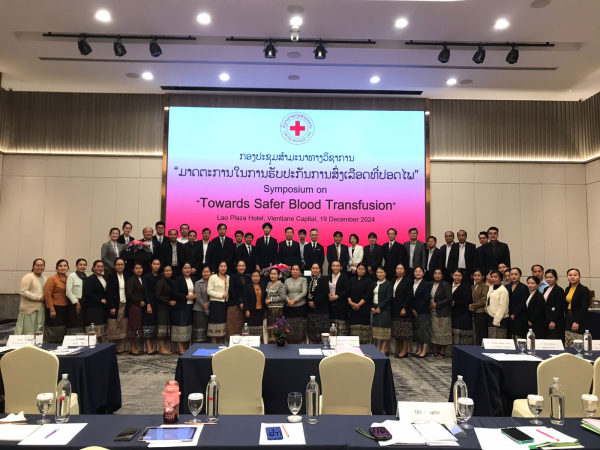KPL
In a pivotal moment for healthcare advancement, experts from the Lao PDR and Japan gathered for an academic seminar titled "Towards Safer Blood Transfusion " The event served as a critical platform for exchanging expertise and strategies to improve the safety and quality of blood donation systems in the Lao PDR.

(KPL) In a pivotal moment for healthcare advancement, experts from the Lao PDR and Japan gathered for an academic seminar titled "Towards Safer Blood Transfusion" The event served as a critical platform for exchanging expertise and strategies to improve the safety and quality of blood donation systems in the Lao PDR.
The seminar was attended by President of the Lao Red Cross, Mr. Khamlavanh Chanthalavanh, Third Secretary of the Japanese Embassy in Laos, Mr. Taiju Kikuchi, and Head of the National Blood Institute, Lao Red Cross, Dr. Chanthala Souksakhone along with other key officials.
In his opening remarks, Mr. Khamlavanh Chanthalavanh highlighted the seminar's importance, emphasizing the irreplaceable role of human donors in healthcare. While scientific advancements have transformed medicine, no technology exists to replicate human blood, making voluntary donations essential for saving lives and supporting critical medical treatments.
Safe blood donation is vital in the Lao PDR, particularly for reducing maternal mortality during childbirth. A reliable blood supply is necessary at every healthcare level, from central hospitals to rural clinics. Blood donations also address severe anemia in children caused by conditions like malaria, dengue fever, and bone marrow disorders. Moreover, blood plays a crucial role in surgeries, emergency care, disaster responses, and treatments for diseases such as leukemia and cancer.
The seminar highlighted the collective efforts of government agencies, the Lao Red Cross, the National Blood Center, the Ministry of Public Health, and other stakeholders in maintaining a robust blood supply chain. These organizations aim to increase voluntary blood donations to meet demand, ensure donor health through rigorous screening and support, uphold stringent standards in testing, processing, storage, and distribution of blood and its components.
The Lao PDR’s blood services network includes the National Blood Center in Vientiane, 17 provincial blood centers, and 32 district-level collection units, working collectively to achieve annual goals while enhancing the system's quality and reliability.
Experts from both nations reiterated the importance of voluntary donors who meet strict health criteria and undergo thorough testing. The proper handling of blood—separation, storage, and transportation—was also identified as a top priority for ensuring safety and effectiveness.
The seminar concluded with a resounding call for sustained collaboration between the Lao PDR and Japan. The partnership underscores the significance of international cooperation in strengthening healthcare systems. By working together, both nations are committed to building a resilient and high-quality blood donation infrastructure that meets the growing needs of the Lao population.
The event represents a significant milestone in public health, setting the foundation for future advancements in life-saving medical care.
KPL